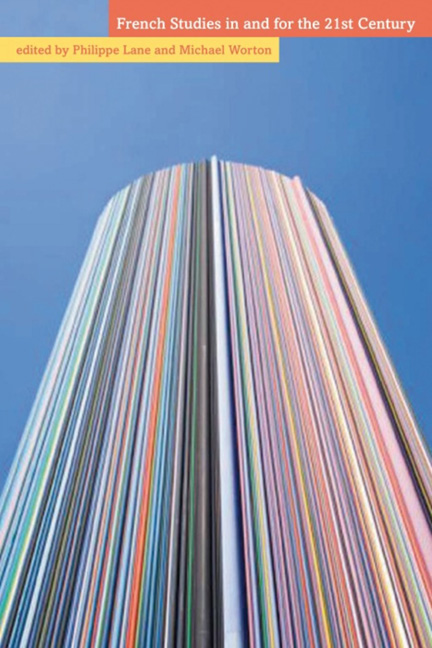Book contents
- Frontmatter
- Contents
- Notes on Contributors
- Foreword
- Foreword by His Excellency
- Part I: Contextualisations
- Part II: Research and Public Engagement Strategies
- Part III: The Place of Women and Gender in French Studies
- 6 Gender and the French Language: The longue durée of French Studies in the UK
- 7 Contemporary Women's Writing in French: Future Perspectives in Formal and Informal Research Networks
- 8 French Studies and Discourses of Sexuality
- Part IV: The Place of Literature
- Part V: The Place of Linguistics in French Studies Today
- Part VI: Theatre, Cinema and Popular Culture
- Part VII: Area Studies, Postcolonial Studies and War and Culture Studies
- Part VIII: Adventures in Language Teaching
- Appendices. Addresses to the Future of French Studies Conference
6 - Gender and the French Language: The longue durée of French Studies in the UK
from Part III: The Place of Women and Gender in French Studies
- Frontmatter
- Contents
- Notes on Contributors
- Foreword
- Foreword by His Excellency
- Part I: Contextualisations
- Part II: Research and Public Engagement Strategies
- Part III: The Place of Women and Gender in French Studies
- 6 Gender and the French Language: The longue durée of French Studies in the UK
- 7 Contemporary Women's Writing in French: Future Perspectives in Formal and Informal Research Networks
- 8 French Studies and Discourses of Sexuality
- Part IV: The Place of Literature
- Part V: The Place of Linguistics in French Studies Today
- Part VI: Theatre, Cinema and Popular Culture
- Part VII: Area Studies, Postcolonial Studies and War and Culture Studies
- Part VIII: Adventures in Language Teaching
- Appendices. Addresses to the Future of French Studies Conference
Summary
This chapter seeks to explore the notion that the study of French in the UK today is framed by a series of historical assumptions about the nature of the French language, and about the implications of speaking French for those of us who are British-based. In this perspective, much of what we observe today in our university French departments may have deep-set historical roots. In the longue durée of French in the UK, the language has been represented, this chapter argues, as essentially feminine, and as alien to an English national identity constructed as masculine. A specifically English view about the value and implications of actually speaking the language has developed over time, from the eighteenth century through to the nineteenth century and, in some measure, it is this representation that continues to influence the status we accord today to the discipline of learning French.
Studying French in UK universities remains a traditionally female activity. The overall student cohort, undergraduate/postgraduate taught/ postgraduate research combined, has continued to be overwhelmingly feminine over the past decade: in 1996–97, 69 per cent of all those enrolled were women, and ten years later, in 2007–8, the percentage was the same. Admittedly, this is not such a large gender imbalance as in subjects like engineering for example, where the percentage of male students is consistently around 88 per cent in this same decade, but it is still notable. In French however, unlike engineering, it is the minority sex which comes to direct and lead university departments of study. The pattern of engineering as a male discipline continues from undergraduate level, through to research, and then on into the staffing of higher education institutions. French departments, on the other hand, start off female at degree level, then become more gender balanced in research, and finally become strongly male at senior levels, and only feminised at junior, and very junior grades.
- Type
- Chapter
- Information
- French Studies in and for the 21st Century , pp. 75 - 85Publisher: Liverpool University PressPrint publication year: 2011

